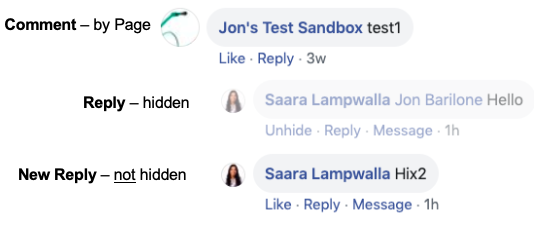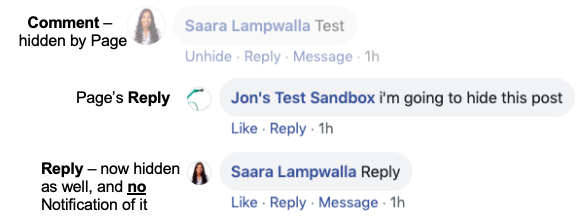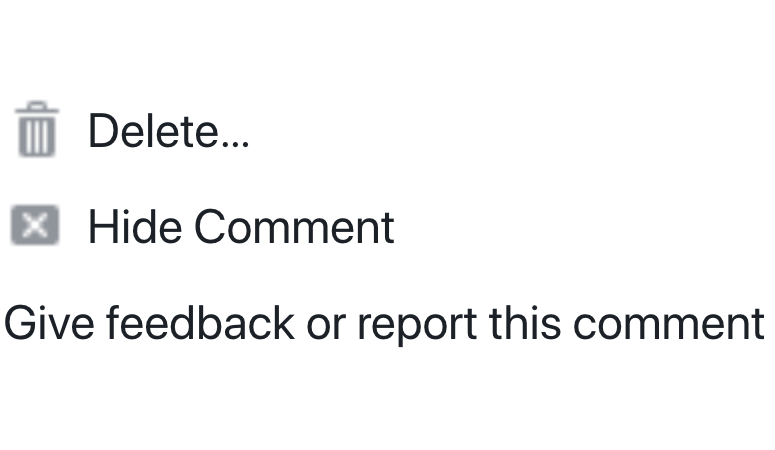Why Public Agencies Shouldn’t “Hide” Facebook Comments
DISCLAIMER: We are not attorneys. Always consult with your legal counsel before creating or adjusting policies.
If your website is a soapbox (pushing information out one way), then your Facebook Page is like a hosted dinner party where you’ve invited guests (your residents/community) to hang out and dialogue.
Then, right as you’re telling your friends about the cool new Parks & Rec activity classes coming for the summer, someone injects themselves into the conversation, screaming about how all government is awful and anyone who puts their kids in these activity classes is an unfit parent.
So, you can ignore the comment, hide it, or delete it. What do you do?
- Ignoring a comment might encourage more bad behavior from that commenter or others. Or, you may actually have advocates come to your defense. There’s really no way of knowing how it would turn out.
- As Tripepi Smith learned from ArchiveSocial CEO Anil Chawla at an April 2019 CAPIO “Social Media Academy for Government Communicators” workshop, hiding a comment is risky business.
- Deleting a comment could open you up to more scrutiny or even a lawsuit. (So make sure you have a good Social Media Policy! See below.)
Hiding Comments Sounds Tempting, But Don’t Do It
Facebook first gave Pages the ability to “hide” comments several years ago. Hiding a comment essentially lets you block it from showing up on your Page without outright deleting it.
A handy feature, right? You don’t have to upset someone by deleting their comment. You just sweep it under the rug. The person who posted the comment doesn’t get a Notification that their comment has been hidden. Only Page Admins, the commenter and the commenter’s friends can see a Hidden comment.
And that’s fine if your Facebook Page is for a private company, a brand or a celebrity. But public agencies and elected officials have a different set of rules when it comes to their social media sites. All thanks to the increased perception of social media as a “public forum.”
In the past, Tripepi Smith has recommended this practice of “hiding” Facebook comments to clients. As social network platforms and their feature sets constantly evolve, our understanding of how to best leverage them has to evolve as well.
Hiding a New Comment Stops Notifications of Replies to That Comment
One of the biggest reasons Tripepi Smith now recommends against hiding Comments is that the original Commenter and their Friends could continue to have a conversation via Replies without you knowing it’s happening. Remember: no one receives a Notification if their Comment/Reply was Hidden. It’s the equivalent of being muted on a conference call–you’re talking on your end but no one else realizes it and you can’t unmute yourself.
We have confirmed via testing that Hiding a new Comment (i.e. not a Reply) means Page Admins do not receive Notifications of new Replies under that Comment. See the explanation below:

When you Hide a Reply, only that single Reply is hidden. The person Replying can still add new, unhidden Replies and you will receive Notifications of those new Replies.

When you hide a new Comment, the entire Comment ‘thread’ (including any Replies to it) are hidden from the Page. And you will NOT receive new Notifications about Replies to the hidden Comment thread.
Social Media as a (Limited) Public Forum
Think of it this way: if someone walked up the mic/podium at a public Council Meeting and rattled off a negative comment about the Council or City staff, could you instruct your City Clerk to not record it? People have a right to disagree with what your agency does. They can even be snarky and angry while they’re doing it. In the public sector, you learn to squeeze a stress ball, say “thank you for your input” through clenched teeth and move on.
Social media has become a vital platform for speech. Every year, we see more legal precedent taking us toward declaring social media sites as “public forums” in the same vein as public meetings. (Check out “Twenty-First Century First Amendment: Public Forums in the Digital Age” from Yale Law School as a good primer) It’s a good bet that your community thinks of your Facebook Page as a public forum already.
Get a Social Media Policy that outlines user behavior on your sites
All Facebook users have to abide by Facebook’s Community Standards. But you can impose even stricter rules of conduct on your Facebook Page by creating your own Social Media Policy or Code of Conduct. (We have always liked Coke’s “House Rules” label) If you already have a Social Media Policy that includes how users should behave themselves on your social media sites, that’s great! If not, here are a few good places to start:
- View the Institute for Local Government’s collection of Social Media Policies.
- Check out Culver City’s Social Media Policy, especially the “Postings or comments to City social media sites shall NOT contain any of the following” bullet list. Comments that violate the City’s Social Media Policy can be deleted. (And the City has a tool that archives social media content as well as a process for documenting any deletion, so they’re covered!)
- Call Tripepi Smith at 844-TS-COMM-1 for help putting a Social Media Policy together.
Repeat After Us: “It’s Either a Violation or it Isn’t”
As far as Facebook is concerned, there is very little gray area when it comes to their Community Standards. If you violate them, there are consequences. It should be no different for users leaving comments on your public agency’s Facebook Page. They have to abide by Facebook’s Community Standards and your standards (as long as your standard/code of conduct/social media policy is reasonable and doesn’t inhibit free speech).
Need Help With Your Social Media Policy or Want to Chat About Facebook?
The Tripepi Smith team is full of insights like this one. Come chat with us on our Facebook Page!


